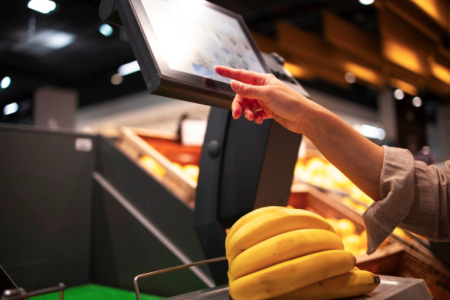Natalie Barr shares alarming insights about Australia’s move towards a cashless society
By
VanessaC
- Replies 21
The transition to a cashless society in Australia has been a topic of heated debate in recent years.
While the convenience of digital payments is undeniable, Sunrise host Natalie Barr has raised significant concern about the potential risks of becoming overly reliant on digital currency.
This comes in the wake of a warning from the Reserve Bank Governor that Australians might have to pay a fee to access physical cash in the future.
Barr's concerns stem from the potential for system failures that could bring the country to a standstill if there was no physical cash in circulation.
She cited the Optus outage in November, which left millions of Australians without phone and internet connectivity.
This resulted in many small businesses being unable to accept payments as they relied on EFTPOS linked to the telco.
While such outages are not uncommon, with Telstra experiencing a similar issue in May and Westpac Bank going offline just last week, they cause issues in the everyday lives of their customers.
These incidents also highlight the vulnerabilities of a digital-only economy. If there is no circulating cash, a simple network disruption could have far-reaching consequences.
The Westpac outage, in particular, caused panic among customers who were unable to see their money when they logged into their accounts.
Many mistakenly thought there had been a hack, illustrating the potential for confusion and fear in a cashless society.
Despite the push towards a cashless society, there are those who believe that there will always be a place for hard currency in the economy.
Minister for Government Services Bill Shorten has stated that physical cash is still essential and hoped that we will not see a world where 'you've got to pay cash to use cash'.
The Cost of Cash
While the convenience of digital payments is undeniable, the cost of maintaining physical cash is growing.
Banks are looking to recoup some of these costs, which could result in customers having to pay a fee to access their own cash.
Some customers and businesses already have to pay a surcharge whenever a 'tap-and-go' payment is done—essentially paying for the infrastructure and systems that facilitate digital payments.
This is a concept that Barr finds difficult to grasp, stating that the idea of paying for the 'privilege' to use your own notes and coins handled by your banks is hard to accept.
'I don't think this will go down well with Aussies—if we have to pay to use our own cash. Let's hope it doesn't get that,' she said.
Reserve Bank of Australia (RBA) Governor Michele Bullock recently highlighted that the share of consumer payments made using cash dropped from 70 per cent in 2007 to only 13 per cent last year.
This trend has put pressure on the running costs of ATMs and the physical distribution of notes and coins.
She warned that the cost of distributing cash could lead to customers being charged for using banknotes, similar to how they are now charged for credit card transactions.
'The issue with cash has always been that businesses don't really understand the costs of cash in their business,' she said in an interview.
'They are, at the moment, understanding it a bit more, but in the past, they haven't internalised the cost of processing.'
She argued that businesses need to understand the costs associated with handling cash, including the need for registers and safes, security measures, and the time and effort required to physically deposit cash at a bank.
She also believed that customers need to pay to use cash and the fees for cash distribution.
'Having said that, it's also true that as economists, you want people to face the prices of using particular services that reflect the cost of those services,' she added.
'It's very difficult to actually enforce payment of cash, but what's going to happen, and what [is happening] at the moment, is [that] the costs end up embedded in the costs of the financial institutions that are providing the services.'
Furthermore, the number of ATMs and bank branches where people can access cash has been steadily declining. While Bullock stated that the distances people need to travel to access cash have changed only a little in recent years, she acknowledged that this may not be the case in the future if access points continue to decline.
The RBA is reportedly keen on maintaining a 'broad coverage of ATMs at reasonable prices, particularly in regional and remote areas' and is open to suggestions from the industry on how the central bank’s regulation could help.
As the sustainability of the current distribution system is in doubt, Australia may need to consider alternative models, such as a wholesale distribution arrangement, according to Ms Bullock.
 The transition to a cashless society is not a straightforward issue. While the convenience and efficiency of digital payments are clear, the potential risks and costs associated with this shift cannot be ignored.
The transition to a cashless society is not a straightforward issue. While the convenience and efficiency of digital payments are clear, the potential risks and costs associated with this shift cannot be ignored.
As Australia continues to move towards a cashless future, it is crucial to consider all aspects of this transition and ensure that the needs and concerns of all Australians are taken into account.
What are your thoughts on this issue? Do you think Australia is ready to become a cashless society? Let us know in the comments below.
While the convenience of digital payments is undeniable, Sunrise host Natalie Barr has raised significant concern about the potential risks of becoming overly reliant on digital currency.
This comes in the wake of a warning from the Reserve Bank Governor that Australians might have to pay a fee to access physical cash in the future.
Barr's concerns stem from the potential for system failures that could bring the country to a standstill if there was no physical cash in circulation.
She cited the Optus outage in November, which left millions of Australians without phone and internet connectivity.
This resulted in many small businesses being unable to accept payments as they relied on EFTPOS linked to the telco.
While such outages are not uncommon, with Telstra experiencing a similar issue in May and Westpac Bank going offline just last week, they cause issues in the everyday lives of their customers.
These incidents also highlight the vulnerabilities of a digital-only economy. If there is no circulating cash, a simple network disruption could have far-reaching consequences.
The Westpac outage, in particular, caused panic among customers who were unable to see their money when they logged into their accounts.
Many mistakenly thought there had been a hack, illustrating the potential for confusion and fear in a cashless society.
Despite the push towards a cashless society, there are those who believe that there will always be a place for hard currency in the economy.
Minister for Government Services Bill Shorten has stated that physical cash is still essential and hoped that we will not see a world where 'you've got to pay cash to use cash'.
The Cost of Cash
While the convenience of digital payments is undeniable, the cost of maintaining physical cash is growing.
Banks are looking to recoup some of these costs, which could result in customers having to pay a fee to access their own cash.
Some customers and businesses already have to pay a surcharge whenever a 'tap-and-go' payment is done—essentially paying for the infrastructure and systems that facilitate digital payments.
This is a concept that Barr finds difficult to grasp, stating that the idea of paying for the 'privilege' to use your own notes and coins handled by your banks is hard to accept.
'I don't think this will go down well with Aussies—if we have to pay to use our own cash. Let's hope it doesn't get that,' she said.
Reserve Bank of Australia (RBA) Governor Michele Bullock recently highlighted that the share of consumer payments made using cash dropped from 70 per cent in 2007 to only 13 per cent last year.
This trend has put pressure on the running costs of ATMs and the physical distribution of notes and coins.
She warned that the cost of distributing cash could lead to customers being charged for using banknotes, similar to how they are now charged for credit card transactions.
'The issue with cash has always been that businesses don't really understand the costs of cash in their business,' she said in an interview.
'They are, at the moment, understanding it a bit more, but in the past, they haven't internalised the cost of processing.'
She argued that businesses need to understand the costs associated with handling cash, including the need for registers and safes, security measures, and the time and effort required to physically deposit cash at a bank.
She also believed that customers need to pay to use cash and the fees for cash distribution.
'Having said that, it's also true that as economists, you want people to face the prices of using particular services that reflect the cost of those services,' she added.
'It's very difficult to actually enforce payment of cash, but what's going to happen, and what [is happening] at the moment, is [that] the costs end up embedded in the costs of the financial institutions that are providing the services.'
Furthermore, the number of ATMs and bank branches where people can access cash has been steadily declining. While Bullock stated that the distances people need to travel to access cash have changed only a little in recent years, she acknowledged that this may not be the case in the future if access points continue to decline.
The RBA is reportedly keen on maintaining a 'broad coverage of ATMs at reasonable prices, particularly in regional and remote areas' and is open to suggestions from the industry on how the central bank’s regulation could help.
As the sustainability of the current distribution system is in doubt, Australia may need to consider alternative models, such as a wholesale distribution arrangement, according to Ms Bullock.
Key Takeaways
- Sunrise host Natalie Barr has highlighted potential problems with Australia transitioning to a cashless society; among the issues are system failures that could immobilise the economy.
- Barr's comments followed warnings from Reserve Bank Governor Michele Bullock that Australians might have to pay a fee to access physical money in the future.
- The shift towards digital money exposes vulnerabilities, as seen in recent network outages, including at Optus, Telstra, and Westpac Bank.
- RBA Governor Michele Bullock stated that the declining use of cash, down from 70 per cent of consumer payments in 2007 to 13 per cent in 2020, has put pressure on the costs of maintaining and distributing physical money.
As Australia continues to move towards a cashless future, it is crucial to consider all aspects of this transition and ensure that the needs and concerns of all Australians are taken into account.
What are your thoughts on this issue? Do you think Australia is ready to become a cashless society? Let us know in the comments below.









